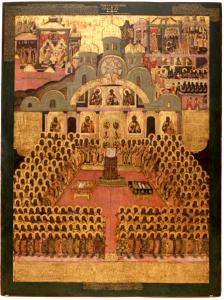
The Seventh Ecumenical Council, the Council of II Nicea (787) made it clear that we are to honor God in many fashions, including and especially through the use of images. Idolatry, to be sure, remains a sin, but just because idols use images does not mean the use of images itself is idolatry (just as everything that moves is not a horse). Idolatry has us give the kind of worship and love which is due to God, the absolute, to something other than God. It has as treat some relative good as the absolute good in and of itself. Proper use of images keeps in mind the proper order of things; God is worshiped and loved in a way beyond all others. Loving others, which is what God expects us to do, does not undermine our worship of God, but rather, is a way in which we can further and better love God by appreciating the good which God has established in them, and so the proper use of images, likewise, allows us to honor God by appreciating the good God has done in and through them.
Thus, II Nicea tells us we are to honor all kinds of images, including the image of God. While it might seem impossible for us to do so, as we can ask how God, who is beyond all images, can be represented through images. And yet, we are told we are made in the image of God, even as Jesus also, in the incarnation, serves as a way for God to be imagined. Both of these give us aways to use images. We honor God by honoring the image of God established in our neighbor. Disregarding the value of any human person is to disregard the image of God found in them, and if we disregard the image in them, we disregard God. Promoting human dignity, especially those who have had that dignity unjustly taken away from them, follows the way God works in the world with grace, and so it not only honors God by honoring God’s image in them, but also honors God by following God’s economic activity. This leads us to realize that as God is expressed through a variety of uncreated energies, divine activities which we can apprehend and name, we can honor God by honoring those who have united themselves with one or more of those energies in order to become holy; thus, we honor God by venerating the saints in relation to the way they apprehend the uncreated energies and manifest the light of God’s glory through lives. And, important especially in relation to II Nicea, we honor images of the saints and of Christ, because the image of an image, though derivative in nature, nonetheless continues to point to and represent God, and so through them we can honor God so long as we keep in mind their derivative nature.
We should honor and respect the image of God in accordance to the way it is found in each and every thing, for by doing that, we honor God. And what better way is there to show such honor but by love? Love must be the foundation of our engagement with God and with each other. We would like to be respected, and so we should respect other. We desire to be loved, and so we should be loving to others. We should do what we expect others to do, even if they don’t do it, We are to love and respect others, even if they don’t show such love and respect back to us. We cannot justify ignoring our own responsibility and duty to love God’s creation by saying others are ignoring their responsibility it. All we would do is obscure the image of God in ourselves if we did so, instead of letting it shine as we should.
If God love us, even though we are sinners, so we can and should love others, no matter what they have done (which, of course, does not mean we can and should ignore the evil they do, but we must respond to it in accordance to the dictates of love). Jesus is very clear, we must act, not by imitating others and using their misdeeds to justify our own, but out of love, following the way God is with us:
And as you wish that men would do to you, do so to them. “If you love those who love you, what credit is that to you? For even sinners love those who love them. And if you do good to those who do good to you, what credit is that to you? For even sinners do the same. And if you lend to those from whom you hope to receive, what credit is that to you? Even sinners lend to sinners, to receive as much again. But love your enemies, and do good, and lend, expecting nothing in return; and your reward will be great, and you will be sons of the Most High; for he is kind to the ungrateful and the selfish. Be merciful, even as your Father is merciful (Lk 6:31-36 RSV)
When we act in this way, we let the image of God, the image of love, shine in and through us, allowing us to become all we should be. We are made to be living images of the God who is love. We must do all we can to reveal that image, never letting it be obscured or defiled by our sin. Loving others, and so allowing the image of God shine through us, is our way to honor the image of God which is found in us. Indeed, this allows us to give the image of God a double-honor, for we honor it both within others as well as in ourselves by acting upon such love. Thus, the more we love, the more we reveal the image of God, allowing God to work in and through us; and the more God works in and through us, the more grace we receive, not just for our salvation, but for our deification. Then, we can be said to partake of the divine nature, connecting ourselves to various uncreated energies of God. Each one we apprehend and unite to becomes a way in which we become more like God, and then through each of them, we have yet more ways we can imagine God in our lives, with each one providing another means by which God can be honored. Thus, we become more and more like God the more we embrace love. It is not easy. We must be merciful. That’s not easy. But the more good we do, the more good we develop and produce, the more good then shall be shared in the world and reveal through that good, the glory of love, the glory of God, allowing more love and honor to be given to God in return. And that is exactly what we should strive to do.
Stay in touch! Like A Little Bit of Nothing on Facebook.
If you liked what you read, please consider sharing it with your friends and family!












